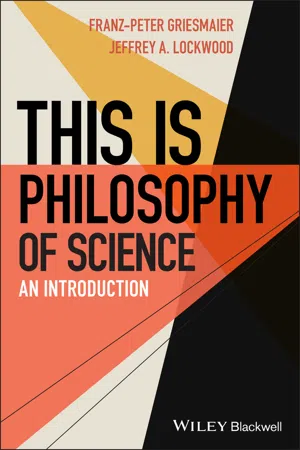
This is Philosophy of Science
An Introduction
- English
- PDF
- Available on iOS & Android
This is Philosophy of Science
An Introduction
About this book
A clear and engaging introduction to the philosophy of science, exploring the role of science within the broader framework of human knowledge and engagement with the world
What are the central features and advantages of a scientific worldview? Why do even reasonable scientists sometimes disagree with each other? How are scientific methods different than those of other disciplines? Can science provide an objective account of reality? This is Philosophy of Science introduces the most important philosophical issues that arise within the empirical sciences.
Requiring no previous background in philosophy, this reader-friendly volume covers topics ranging from traditional questions about the nature of explanation and the confirmation of theories to practical issues concerning the design of physical experiments and modeling. Incisive and accessible chapters with relevant case-studies and informative illustrations examine the function of thought experiments, discuss the realism/anti-realism debate, explore probability and theory testing, and address more challenging topics such as emergentism, measurement theory, and the manipulationist account of causation.
- Describes key philosophical concepts and their application in the empirical sciences
- Highlights past and present philosophical debates within the field
- Features numerous illustrations, real-world examples, and references to additional resources
- Includes a companion website with self-assessment exercises and instructor-only test banks
Part of Wiley-Blackwell's popular This Is Philosophy series, This is Philosophy of Science: An Introduction is an excellent textbook for STEM students with interest in the conceptual foundations of their disciplines, undergraduate philosophy majors, and general readers looking for an easy-to-read overview of the subject.
Frequently asked questions
- Essential is ideal for learners and professionals who enjoy exploring a wide range of subjects. Access the Essential Library with 800,000+ trusted titles and best-sellers across business, personal growth, and the humanities. Includes unlimited reading time and Standard Read Aloud voice.
- Complete: Perfect for advanced learners and researchers needing full, unrestricted access. Unlock 1.4M+ books across hundreds of subjects, including academic and specialized titles. The Complete Plan also includes advanced features like Premium Read Aloud and Research Assistant.
Please note we cannot support devices running on iOS 13 and Android 7 or earlier. Learn more about using the app.
Information
Table of contents
- This is Philosophy of Science
- Contents
- Preface
- Acknowledgments
- About the Companion Website
- 1 Pillars of Science: Reasons, Knowledge, and Truth
- 2 Evidence, Observation, and Measurement
- 3 Uses of Evidence
- 4 Evidence, Rationality, and Disagreement
- 5 The Nature of Probability
- 6 Do Not Be Misled: Confounds and Controls
- 7 Physical Experiments and Their Design
- 8 Experimental Methods That They Don’t Teach
- 9 Models: Useful Lies and Informative Fictions
- 10 Causation and Causal Inference
- 11 Strange Causation – Time Travel and Remote Action
- 12 But Is Any of It Real?
- 13 Explanation and Understanding
- 14 Fundamental Theories and the Organization of Science
- 15 Scientific Progress
- Index
- EULA